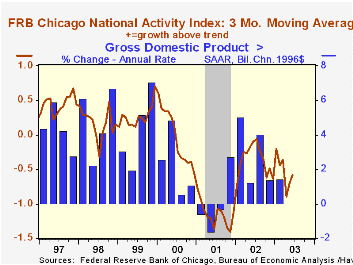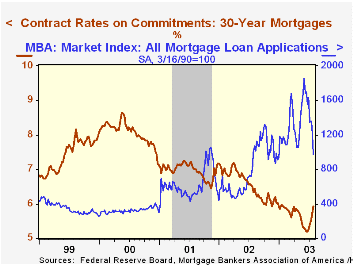 Global| Jul 30 2003
Global| Jul 30 2003Mortgage Applications Plunged
Summary
The Chicago Fed National Activity Index (CFNAI) improved slightly in June to 0.32 from a reading of 0.40 in May. A zero value of the CFNAI indicates that the economy is expanding at its historical trend rate of growth of over 3% [...]

The Chicago Fed National Activity Index (CFNAI) improved slightly in June to –0.32 from a reading of –0.40 in May.
A zero value of the CFNAI indicates that the economy is expanding at its historical trend rate of growth of over 3% a.r.
The June index was the highest since November, 2002. The three-month moving average of the CFNAI improved to –0.58 from -0.70 in May.
The CFNAI is a weighted average of 85 indicators of economic activity. The indicators reflect activity in the following categories: production and income, the labor market, personal consumption and housing, manufacturing and trade sales, and inventories & orders. Employment data accounted for –0.35 of the –0.32 June index, while output components contributed –0.01 (an improvement from May) and all other components contributed +0.04 up from –0.01 the previous month.
For a complete discussion of the latest Chicago Fed's National Activity Index click here.
| Chicago Fed | June 2003 | May 2003 | June 2002 | 2002 | 2001 | 2000 |
|---|---|---|---|---|---|---|
| CFNAI | -0.32 | -0.40 | -0.04 | -0.33 | -1.19 | -0.13 |

Mortgage applications plunged last week, according to survey data compiled by the Mortgage Bankers Association of America. The overall index of mortgage applications dropped 24.3% on the week to 972.4, the lowest since last December (3/16/90 = 100). The abrupt, sharp upturn in interest rates has put a heavy brake on refinancing activity, pulling that sub-index down 32.9% this last week alone, putting it 58.4% below its all-time high of 9977.8 reached just eight weeks ago on May 30. The index for loan applications for home purchase, however, remained firm, edging down just 3.5% on the week; at 426.9, this index stands 7.3% below its record 460.5 set in that same May 30 week.
Interest rates are the main drag on this market. The contract rate on 30-year fixed rate loans tabulated by the Federal Home Loan Mortgage Corporation (“Freddie Mac”) was up 27 basis points last week to 5.94%, 73 basis points above its recent low set in the week ended June 20 and the highest since mid-January. The bigger part of the impact of this rapid rise in rates has been on refinancing activity, which had been used by consumers to help fund new spending and also to pay down old debt.
The Mortgage Bankers Association surveys between 20 to 35 of the top lenders in the U.S. housing industry to derive its refinance, purchase and market indexes. The weekly survey accounts for more than 40% of all applications processed each week by mortgage lenders.
Visit the Mortgage Bankers Association site at www.mbaa.org.
| MBA Mortgage Applications (3/16/90=100) | 7/25/03 | 7/18/03 | 2002 | 2001 | 2000 |
|---|---|---|---|---|---|
| Total Market Index | 972.4 | 1,284.3 | 799.7 | 625.6 | 322.7 |
| Purchase | 426.9 | 442.4 | 354.7 | 304.9 | 302.7 |
| Refinancing | 4145.8 | 6,181.2 | 3,388.0 | 2,491.0 | 438.8 |
Carol Stone, CBE
AuthorMore in Author Profile »Carol Stone, CBE came to Haver Analytics in 2003 following more than 35 years as a financial market economist at major Wall Street financial institutions, most especially Merrill Lynch and Nomura Securities. She had broad experience in analysis and forecasting of flow-of-funds accounts, the federal budget and Federal Reserve operations. At Nomura Securities, among other duties, she developed various indicator forecasting tools and edited a daily global publication produced in London and New York for readers in Tokyo. At Haver Analytics, Carol was a member of the Research Department, aiding database managers with research and documentation efforts, as well as posting commentary on select economic reports. In addition, she conducted Ways-of-the-World, a blog on economic issues for an Episcopal-Church-affiliated website, The Geranium Farm. During her career, Carol served as an officer of the Money Marketeers and the Downtown Economists Club. She had a PhD from NYU's Stern School of Business. She lived in Brooklyn, New York, and had a weekend home on Long Island.
More Economy in Brief
 Global| Feb 05 2026
Global| Feb 05 2026Charts of the Week: Balanced Policy, Resilient Data and AI Narratives
by:Andrew Cates





